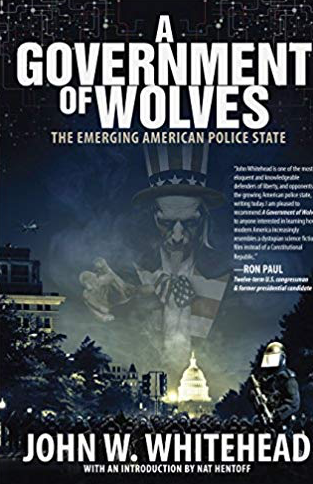We hear a lot about the “do-nothing” Congress. But in fact, legislators have been on a spree of criminalizing previously legal behavior.

U.S. Capitol. (Johnny Silvercloud/Flickr)
By John Kiriakou
Special to Consortium News
 Like a lot of progressives, I like to criticize the “do-nothing Congress.” The media, too, are fond of talking about how a divided Congress, with the House of Representatives controlled by Democrats and the Senate controlled by Republicans, is unable to pass any meaningful legislation. That’s the very definition of gridlock in Washington.
Like a lot of progressives, I like to criticize the “do-nothing Congress.” The media, too, are fond of talking about how a divided Congress, with the House of Representatives controlled by Democrats and the Senate controlled by Republicans, is unable to pass any meaningful legislation. That’s the very definition of gridlock in Washington.
The truth is, however, that the Congress actually does pass a lot of legislation. Much of it is under the radar, and almost all of it criminalizes previously legal behavior.
 According to author John Whitehead, Congress has created, on average, 50 new crimes per year for the past decade. Not 50 new laws. Fifty new crimes. You can now be arrested for selling runny ketchup, for making an obscene gesture at a horse, or for removing llama excrement from a quarantine facility.
According to author John Whitehead, Congress has created, on average, 50 new crimes per year for the past decade. Not 50 new laws. Fifty new crimes. You can now be arrested for selling runny ketchup, for making an obscene gesture at a horse, or for removing llama excrement from a quarantine facility.
The trend is headed in the wrong direction. In just the five years from 2008 until 2013, according to the Congressional Research Service, Congress created 439 new criminal offenses. And that’s in addition to the growing number of state and local crimes for which Americans can be prosecuted.
To make matters worse, many of these federal laws lack any mens rea, or “guilty mind,” requirement. That means you can be prosecuted even without criminal intent. Didn’t mean to break the law? Tough luck. You’re still going to go down for it. After all, that’s how young, aggressive prosecutors get promoted.
Not all criminalization is bad, of course. We really do need laws — new ones in some cases — to combat child pornography, human trafficking, police brutality, cyber crimes and other such affronts. The problem is when Congress oversteps and law enforcement authorities go hog wild, drunk with power.
Searching for a Potato Gun
In late 2013, Coast Guard agents — that’s right, even the Coast Guard has federal agents — stormed the home of a Washington Times reporter to search for a “potato gun.” A what? It’s a homemade device that uses a PVC pipe to launch potatoes and other vegetables into the air. I had one as a kid. My dad made it for me.
The agents didn’t find a potato gun or any other weapon. Instead, they seized the reporter’s notes, which identified her sources — and for which they didn’t have a warrant. The Coast Guard claimed they’d discovered government documents, but they were forced to return the notes after learning the documents were legally obtained through the Freedom of Information Act.
More recently, two environmental protesters went to the headquarters of Devon Energy, a large utility with ties to the Keystone XL Pipeline, where they unfurled a banner in the lobby. It read, a la The Hunger Games, “The odds are never in our favor.”

Spud gun. (Zephyris, CC BY-SA 3.0, Wikimedia Commons)
As the banner unrolled, some glitter fell onto the floor of the lobby. Police arrived, determined the glitter was a “potentially hazardous substance,” and charged the duo with perpetrating a “terrorism hoax.” In the end the charges were dropped — but not before the protesters were booked, fingerprinted and arraigned.
I wish I could tell you that there was light at the end of the tunnel. I wish I could tell you that Congress’s passage of the First Step Act, and its signature by President Donald Trump, had turned things around. I wish I could tell you that Congress had seen the light and had decided to stop passing stupid criminal laws. But that’s not the case.
Late last year, the Justice Department attempted to count the number of actual federal, state and local criminal laws on the books. They stopped counting at 300,000. That means that if you set out to break one criminal law every day, it would take you 800 years to finish the job. And to make matters worse, Congress is granting federal regulatory agencies the authority to promulgate regulations that carry the force of law.
And don’t look to the U.S. Supreme Court for help. A recent decision there found that Alaska state police were within their rights to arrest a man for “disorderly conduct” after he expressed an opinion on social media that hurt their feelings. He said that he didn’t believe state police had the right to target underage drinking at the annual Arctic Man Festival. That opinion, apparently, is a crime.
I always try to end these rants by either offering hope or offering a solution. I have nothing. These are the clowns we’ve elected and repeatedly reelected. This isn’t a partisan issue. Democrats and Republicans are both guilty. I no longer complain about the “do-nothing Congress.” I welcome it. If this is all that Congress can really get done, I wish that it did nothing.
John Kiriakou is a former CIA counterterrorism officer and a former senior investigator with the Senate Foreign Relations Committee. John became the sixth whistleblower indicted by the Obama administration under the Espionage Act—a law designed to punish spies. He served 23 months in prison as a result of his attempts to oppose the Bush administration’s torture program.
The views expressed are solely those of the author and may or may not reflect those of Consortium News.
If you valued this original article, please consider making a donation to Consortium News so we can bring you more stories like this one.
Before commenting please read Robert Parry’s Comment Policy. Allegations unsupported by facts, gross or misleading factual errors and ad hominem attacks, and abusive or rude language toward other commenters or our writers will not be published. If your comment does not immediately appear, please be patient as it is manually reviewed. For security reasons, please refrain from inserting links in your comments, which should not be longer than 300 words.

‘This Desk Kills Fascism’…J K
John has paid his dues. He knows what really happens to those who take the effort of freedom beyond twitter.
I hope I live long enough to see John, Chelsea, Snowden, Bill Binney, Julian Assange, and many others be recognized as the true patriots they are.
I agree.
I wonder how much of this is due to the rise of the Private Prison Industry, a/k/a the Prison Industrial Complex, which spends
$millions on “campaign contributions” to legislators and actually writes for them these new laws and longer sentences, all of which has turned the US into the Incarceration Nation of the world, with more people behind bars than any other nation on earth. Most of these people are the poor and people of color who cannot afford to hire private defense attorneys. Public defenders routinely work out plea deals with the government, where most of the innocent accused end up serving a reduced sentence for crimes they did not commit. Early release on probation has become a second trap, because conditions of probation are set in such a way they are impossible to comply with for many, thus causing the victim into serving additional time for parole violation. Some of these lobby firms are: ALEC – American Legislative Exchange Council; the Neo Group; Core Civic; the Sentencing Project;
Here just one article on this topic:
See:prisonlegalnews.org/news/2018/aug/6/private-prison-firms-use-revolving-door-lobbying-generous-campaign-donations/
American Correctional Association
I think you’ve nailed MOST of the reason for this endless passing of laws that TARGET EVERYDAY PEOPLE–while so-called “Corporate Persons” (and the WEALTHY) re FREE to commit FRAUD, HARM or even KILL ACTUAL PEOPLE and WRECK our ENVIRONMENT. The PROFIT motive is certainly at work—there are now LAWS (or is it “only” Contracts with States) that require 90% or more of prison beds be FILLED in For-Profit Prions & detention centers. Besides money-making, the plethora of criminal laws are a means of SOCIAL CONTROL–the stupid charges surrounding GLITTER dropped off a banner opposing pipelines is a clear example of the relentless attack on our FIRST AMENDMENT rights to Freedom of Assembly to dissent and protest.
Nice John.
The land of the free and the home of the brave is a joke.
Land of the fee and home of the slave.
U mean, “the land of the fee, & home of the slave?”
Thank you Mr Kiriakou for this overview of appalling actions of Congress (both houses, both so-called parties). In sum – the two headed single party is doing what it is paid to do: protect and serve the upper 20% of the population, those with all of the clout, those who really run this country. Every encroachment on our civil and human liberties to have the right to an opposing opinion and voice it, whether verbally, online or in any other way, to police (literally) every move, decision, act, choice we make is for the paymasters and against our freedom of thought and deed.
These dastardly acts are not all that the Congress managed to pass, however. Two other bills got overwhelming support from both the DemReps also in order to maintain the socio-economic, imperialist status quo at home and abroad all to the benefit of that top 20% of the “income” brackets: the obscene tax cuts for the very to ultra wealthy (including such Congress members as Pelosi herself) *and* an even more obscene and decidedly amoral, incomprehensible (literally) sum to the ever-grasping, Moloch-Mammon worshiping MIC in order to destroy more peoples’ lives (far from these shores, of course), destroy more of the planetary environment, fatten yet more the offshore accounts of such as raytheon’s shareholders, board members etc…. (How anyone can imagine that they have any morality, any ethics, and at the same time work for any one of these execrable, amoral, warmongering companies is beyond my comprehension.)
Keep humanity first because a new president is on the way who will put this into action. America should know who he is by now and if they don’t they need to find out and quickly time is ticking away this is the moment of realisation for a new way forward for all of us as I have given up on our Australian government but Andrew Yang is someone I can believe in as he knows the math and will lead the world into the 21st century In a very positive way for the people eg eliminating poverty trickle up not down it’s called growing healthy communities
I get your drift, Sally. In Australia we have two parties one philosophy ie two parties which are totally subservient to Washington so who is US President makes a difference to every Australian.
What does this have to do with the article (except as an extreme stretch to hang campaign propaganda on)?
Police State. Getting worse year by year.